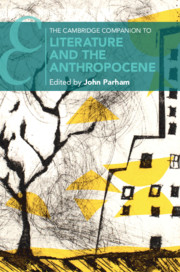Book contents
- The Cambridge Companion to Literature and the Anthropocene
- The Cambridge Companion to Literature and the Anthropocene
- Copyright page
- Contents
- Figures
- Contributors
- Acknowledgements
- Chronology
- Introduction
- Prologue Earth, Anthropocene, Literary Form
- Part I Anthropocene Forms
- Part II Anthropocene Themes
- Chapter 10 Catastrophe
- Chapter 11 Animals
- Chapter 12 Humans
- Chapter 13 Fossil Fuel
- Chapter 14 Warming
- Chapter 15 Ethics
- Chapter 16 Interspecies
- Chapter 17 Deep Time Visible
- Further Reading
- Index
- Cambridge Companions To …
Chapter 15 - Ethics
from Part II - Anthropocene Themes
Published online by Cambridge University Press: 28 July 2021
- The Cambridge Companion to Literature and the Anthropocene
- The Cambridge Companion to Literature and the Anthropocene
- Copyright page
- Contents
- Figures
- Contributors
- Acknowledgements
- Chronology
- Introduction
- Prologue Earth, Anthropocene, Literary Form
- Part I Anthropocene Forms
- Part II Anthropocene Themes
- Chapter 10 Catastrophe
- Chapter 11 Animals
- Chapter 12 Humans
- Chapter 13 Fossil Fuel
- Chapter 14 Warming
- Chapter 15 Ethics
- Chapter 16 Interspecies
- Chapter 17 Deep Time Visible
- Further Reading
- Index
- Cambridge Companions To …
Summary
Ethics and the Anthropocene need to be actively engaged with each other in order to facilitate our sense of what responsibilities we hold. This chapter analyses this issue in three contemporary Malaysian novels: Keris Mas’s Jungle of Hope (2009), Zakaria Ali’s The Dam (2009) and Chuah Guat Eng’s Days of Change (2010). These are informed by three areas of ethical enquiry in the Anthropocene: reassessing present norms, raising novel concerns and rethinking traditional concerns (Schmidt, Brown and Orr). The chapter argues that the ethics of activism can be traced in these novels – explored through the representation of diverse groups of people and how they exert and negotiate power when environmental governance and decisions are defined and constrained by the state, the capitalists and the ideology propagated by both, and when limited space is provided for civil society participation.
- Type
- Chapter
- Information
- The Cambridge Companion to Literature and the Anthropocene , pp. 258 - 272Publisher: Cambridge University PressPrint publication year: 2021
- 1
- Cited by

